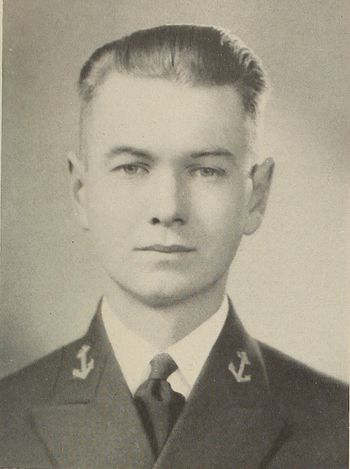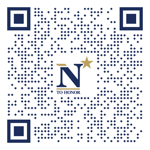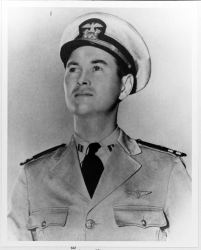PATRICK H. HART, LT, USN
Patrick Hart '37
Lucky Bag
From the 1937 Lucky Bag:
PATRICK HENRY HART
Los Angeles, California
"Pat" "Bucket" "Admiral"
Plebe year, Pat admits, wasn't any too much fun, but necessary for the life to follow. However, the next three years showed him to be in the right place. As in days of yore at Polytechnic High, academics were fruit. His gymnastic talents, too, showed up to good advantage. Though not particularly a snake, Pat could be paged at Carvel any Sunday afternoon,—and usually be found! During four years here on the Severn, Pat has won a place in all our hearts. His ability to make friends and get along with people is a sure indication of success.
Gym 4, 3, 2, 1, gNt, Captain 1. Black N. Quarterdeck Society. Three Stripes.

PATRICK HENRY HART
Los Angeles, California
"Pat" "Bucket" "Admiral"
Plebe year, Pat admits, wasn't any too much fun, but necessary for the life to follow. However, the next three years showed him to be in the right place. As in days of yore at Polytechnic High, academics were fruit. His gymnastic talents, too, showed up to good advantage. Though not particularly a snake, Pat could be paged at Carvel any Sunday afternoon,—and usually be found! During four years here on the Severn, Pat has won a place in all our hearts. His ability to make friends and get along with people is a sure indication of success.
Gym 4, 3, 2, 1, gNt, Captain 1. Black N. Quarterdeck Society. Three Stripes.
Biography & Loss
From Military Hall of Honor:
Patrick H. Hart was born in Manhattan, New York City, NY to Eugene James and Emma Elizabeth Carrell Hart who were married in Manhattan, NYC, NY on 09 Oct 1907. They also had another son, Eugene James Jr born about 1904. Pat, as he was sometimes called, attended Polytechnic High School in Los Angeles and graduated in May 1932. He was senior class president, President of the Ionian Society and President of the Scholarship Society.
Patrick took the Naval Academy entrance exam in the Spring of 1933 and passed among the highest in entrance examinations. He received a California Congressional appointment and entered the US Naval Academy on 13 Jun 1933. While at the Academy Hart was known as Pat and sometimes Bucket. His classmates wrote in the Lucky Bag yearbook, "Plebe year, Pat admits, wasn't any too much fun, but necessary for the life to follow. However, the next three years showed him to be in the right place. As in days of yore at Polytechnic High, academics were fruit. His gymnastic talents, too, showed up to good advantage. Though not particularly a snake, Pat could be paged at Carvel any Sunday afternoon, -- and usually be found! During four years here on the Severn, Pat has won a place in all our hearts. His ability to make friends and get along with people is a sure indication of success." As mention, Pat participated in gymnastics each year at the Academy, as well as, Quarterdeck Society, and gNt., He graduated with 327 other midshipmen and commissioned an Ensign on 3 Jun 1937.
His first sea duty tour on board the battleship USS Colorado (BB-45) began shortly after graduation on 30 Jun 1937. Later, according to the Naval History and Heritage Command, he served on board the battleship USS West Virginia (BB-48). He received orders on 03 May 1939 to report to the Commandant, Naval Air Station (NAS) Pensacola, FL to begin his flight training under instruction in June 1939. He also earned a sub-speciality as a French language interpreter. He completed his flight training and was awarded his naval aviator wings in the spring of 1940. On 28 May 1940, Ensign Hart, received orders involving flying to report for duty to Scouting Squadron 42 (VS-42). About the time he completed his flight training, he was promoted to Lt (Junior Grade) on 3 Jun 1940. On 24 Jun 1940, Ens. Hart received orders to report to Torpedo Squadron Three (USS Saratoga (CV-3)) rescinding the orders to VS-42. Several weeks later on 5 July 1940, he reported for duty with Torpedo Squadron Three (VT-3) embarked on Saratoga.
Saratoga was in a refit/overhaul status most of 1941, therefore, her attached squadrons, including VT-3, were based at various Naval Air Stations in Hawaii or the west coast. On 07 Dec 1941, Saratoga was entering San Diego to embark her air group, which were ashore while she was undergoing refit. Shortly after the attack on Pearl Harbor, Saratoga became the flagship of an unsuccessful American effort to relieve Wake Island. A few weeks later on 11 Jan 1942 Saratoga was torpedoed by a Japanese submarine. She steamed to Pearl Harbor for temporary repairs arriving on 13 Jan 1942. She returned to the Bremerton Navy Yard for permanent repairs on 09 Feb 1942. During the yard period Saratoga's embarked squadrons were transferred elsewhere. VT-3 was assigned first to NAS Pearl Harbor at Ford Island then to NAS Kaneohe Bay on Hawaii.
Hart was promoted to the temporary rank of Lieutenant on 02 Jan 1942 and became executive officer of VT-3 later that spring.
On 28 May 1942, the squadron was temporarily reassigned to the aircraft carrier, USS Yorktown (CV-5). Aviation squadrons from Air Group Three flew on board Yorktown shortly after she got underway from Pearl Harbor in company with the USS Hornet (CV-8) and USS Enterprise (CV-6). They steamed to a point on the navigation chart nicknamed "Point Luck" to await the arrival of the Japanese Striking Force, which was steaming from Japan to attack Midway Island.
About a week later on 4 June 1942, Lt Hart and his gunner ARM1 Johnnie Ralph Cole, took off from the Yorktown with other elements of the Yorktown air group to attack the Japanese Striking Forces approaching Midway. Although they had some friendly fighter protection enroute to their targets, VT-3 had to thread their way through a gauntlet of swarming enemy fighters and a hail of anti-aircraft fire. Of the twelve VT-3 torpedo planes that took off from the Yorktown that morning only two survived the attack, but had to ditch. Three of the four crewman survived and were rescued by friendly forces. Lt. Hart and Petty Officer Cole did not return from this mission, and they were listed as missing in action on 04 Jun 1942. Their remains were unrecoverable. On 17 Jun 1942, the Navy Department notified the family of Lt Hart via telegram that he was missing in the service of his country. On 5 Jun 1943, he was "presumed" dead.
Other Information
From researcher Kathy Franz: "Patrick graduated Polytechnic School in Los Angeles in Winter 1932. Hi-Y. Pres., Ionian Society, Gym Team Letterman, Poly Knight. Goal: Annapolis Graduate."
He has a Find A Grave entry here.
His mother was listed as next of kin.
Photographs
From Hall of Valor:
The President of the United States of America takes pride in presenting the Navy Cross (Posthumously) to Lieutenant Patrick Henry Hart (NSN: 0-78621), United States Navy, for extraordinary heroism in operations against the enemy while serving as Pilot of a carrier-based Navy Torpedo Plane and Executive Officer of Torpedo Squadron THREE (VT-3), attached to the U.S.S. YORKTOWN (CV-5), during the "Air Battle of Midway," against enemy Japanese forces on 4 June 1942. Participating in a Torpedo Plane assault against Japanese naval units, Lieutenant Hart, in the face of tremendous anti-aircraft fire and overwhelming fighter opposition, pressed home his attack to a point where it became relatively certain that, in order to accomplish his mission, he would probably sacrifice his life. Undeterred by the grave possibilities of such a hazardous offensive, he carried on, with extreme disregard for his own personal safety, until his squadron scored direct hits on two enemy aircraft carriers. His self sacrificing gallantry and fortitude were in keeping with the highest traditions of the United States Naval Service. He gallantly gave his life for his country.
General Orders: Bureau of Naval Personnel Information Bulletin No. 309 (December 1942)
Action Date: 4-Jun-42
Service: Navy
Rank: Lieutenant
Company: Torpedo Squadron 3 (VT-3)
Division: U.S.S. Yorktown (CV-5)
Namesake
USS Hart (DD 594) was named for Patrick; the ship was sponsored by his mother.
The "Register of Commissioned and Warrant Officers of the United States Navy and Marine Corps" was published annually from 1815 through at least the 1970s; it provided rank, command or station, and occasionally billet until the beginning of World War II when command/station was no longer included. Scanned copies were reviewed and data entered from the mid-1840s through 1922, when more-frequent Navy Directories were available.
The Navy Directory was a publication that provided information on the command, billet, and rank of every active and retired naval officer. Single editions have been found online from January 1915 and March 1918, and then from three to six editions per year from 1923 through 1940; the final edition is from April 1941.
The entries in both series of documents are sometimes cryptic and confusing. They are often inconsistent, even within an edition, with the name of commands; this is especially true for aviation squadrons in the 1920s and early 1930s.
Alumni listed at the same command may or may not have had significant interactions; they could have shared a stateroom or workspace, stood many hours of watch together… or, especially at the larger commands, they might not have known each other at all. The information provides the opportunity to draw connections that are otherwise invisible, though, and gives a fuller view of the professional experiences of these alumni in Memorial Hall.
September 1937
January 1938
July 1938
January 1939
October 1939
LT Finley Hall '29
LT John Huntley '31
LTjg George Bellinger '32
LTjg Martin Koivisto '32
LTjg Daniel Gothie '32
LTjg Albert Major, Jr. '32
LTjg John McCormack, Jr. '33
LTjg Archibald Stone, Jr. '34
LTjg Wendell Froling '34
LT John Yoho '29 (Training Squadron (VN) 5D8)
CAPT Paul Moret '30 (Training Squadron (VN) 3D8)
LTjg Robert Strickler '32 (Training Squadron (VN) 5D8)
LTjg George Ottinger '32 (Training Squadron (VN) 5D8)
LTjg Dewitt Shumway '32 (Training Squadron (VN) 1D8)
LTjg William Widhelm '32 (Training Squadron (VN) 5D8)
June 1940
LTjg Richard Bull, Jr. '36 (Scouting Squadron (VS) 41)
LTjg Walter Bayless '36 (USS Ranger)
LTjg Ralph Embree '36 (Bombing Squadron (VB) 4)
ENS Lemuel Cooke '39 (USS Ranger)
ENS William Beck, Jr. '40 (USS Ranger)
November 1940
LT William Sisko '31 (Scouting Squadron (VS) 3)
LTjg Jack Ferguson '35 (Bombing Squadron (VB) 3)
LTjg Francis Maher, Jr. '35 (Bombing Squadron (VB) 3)
LTjg John Ennis '35 (Bombing Squadron (VB) 3)
LTjg Harold Shrider '37 (Scouting Squadron (VS) 3)
LTjg Edward O'Hare '37 (Fighting Squadron (VF) 3)
LTjg Howard Nester, Jr. '37 (Bombing Squadron (VB) 3)
ENS Norman White '39 (USS Saratoga)
April 1941
LTjg Jack Ferguson '35 (Bombing Squadron (VB) 3)
LTjg Victor Gadrow '35 (Fighting Squadron (VF) 3)
LTjg Francis Maher, Jr. '35 (Bombing Squadron (VB) 3)
LTjg Harold Shrider '37 (Scouting Squadron (VS) 3)
LTjg Edward O'Hare '37 (Fighting Squadron (VF) 3)
ENS Howard Clark '38 (Fighting Squadron (VF) 3)
ENS Osborne Wiseman '38 (Bombing Squadron (VB) 3)
ENS Marion Dufilho '38 (Fighting Squadron (VF) 3)
ENS William Brady '38 (Scouting Squadron (VS) 3)
ENS Norman White '39 (USS Saratoga)

The "category" links below lead to lists of related Honorees; use them to explore further the service and sacrifice of alumni in Memorial Hall.

